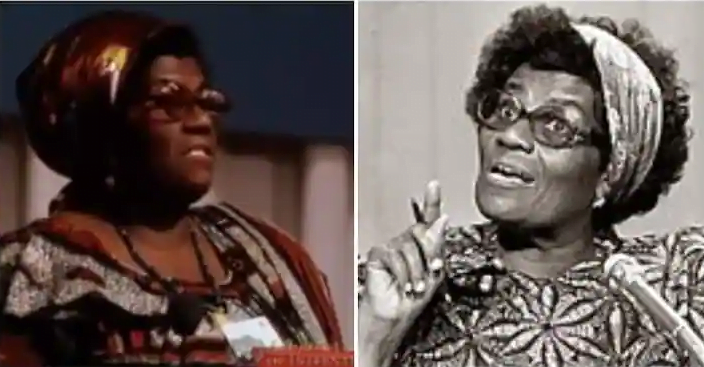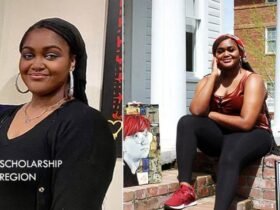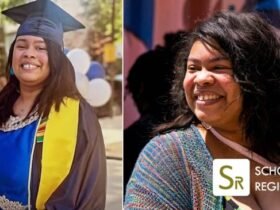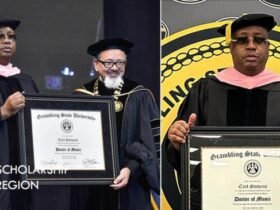Annie Ruth Jiagge is a woman that will always be remembered in Ghana’s history books because of her numerous achievements but mostly because she was the first female in Ghana to become a judge after passing the bar in 1950.
She kicked off her career as a teacher at the Evangelical Presbyterian Girls School and proceeded to the London School of Economics and Political Science to pursue Law. The Achimota School alumnus established the Ghana National Council for Women and Development and was appointed to represent Ghana on a United Nations Commission.
Life, they say, is what you make it. Sometimes, it is not just about the individual since the influence parents have on the eventual success of their children cannot be ruled out. A particular parenting method or just one key decision made concerning children can set them apart from their peers and set them directly on the path to greatness.
Annie Ruth Jiagge became Ghana’s first female Judge, and this history only came to birth following a single good decision her parents made. She was born in Lome, a town in the then French Togoland, and could have spent the rest of her life there, but her parents knew how beneficial it would be for their daughter if she could speak and write good English, so they decided to change her environment.
She was sent to live with her grandmother in Keta, then in British Togoland, and there, she gradually learned the English Language. Annie Ruth Jiagge had her secondary school education at Achimota College. Her initial plan was to follow in her parent’s footsteps, so she set out to become a teacher just like them. She went through the training and graduated in 1937 with her certificate.
After school, she worked for a while as a school teacher and eventually became the Headmistress of the Evangelical Presbyterian Girls’ School from 1940 to 1946. Annie taught for six years, but by her last year as a teacher, she had come to the realization that she wanted her life to be beyond the classroom; becoming a lawyer was her next goal.
Read Also: Brilliant Nigerian lady who bagged Bachelor’s degree at 19, earns Ph.D at 25
The driven aspiring lawyer took the bold step to apply to study at the London School of Economics and Political Science in 1946, and thankfully, she got in. Before leaving for London, a number of her male colleagues who thought they were looking out for her best interest approached and implored her to reconsider her decision to pursue law.
They believed that a venture of such kind would be difficult for a woman to undertake. One even offered to help her gain admission to a dress design school in Paris instead. Annie refused to heed her colleagues’ lack of trust in her capabilities and paid attention to the new goal ahead. To put their worries to rest, however, Annie assured them she would return to the Gold Coast if she failed to pass her first examination.
The brilliant young woman got to the London School of Economics and Political Science very poised to prove her former colleagues wrong, and she did just that. She sat for her first exams and smoothly aced them. After that, Annie successfully went through her studies, graduated with her LLB in 1949, and got called to the bar in 1950.
In an interview, Annie Ruth Jiagge encouraged women why they must never to look down on themselves or allow men to expect less from them. “We can do so much, but we must always do it as women, not as imitations of men. God has his purpose in making a woman as she is.
Her nature is different. He gave us equal intelligence with men and in addition, gave us the womanly qualities that make it possible for us to do what we must do in our way”, she told Abe and Edith Halpherin. Annie left the United Kingdom for her motherland the same year she got called to the bar and practiced law privately for a while. After three years, she transitioned from a lawyer to a magistrate after getting married.
She excelled in her new role and became a circuit court judge after six years. This made her the very first female judge in Ghana. She gradually rose through the ranks, becoming a High Court judge, an Appeal Court judge, and a president of the Court of Appeal. She was also known to be a strong advocate for women’s rights worldwide, in addition to her accomplishments as a lawyer and judge.
Read Also: Brilliant primary school teacher wins Teacher of the Year award, gets N23 million cash reward
The judge was the primary architect of the Declaration on the Elimination of Discrimination Against Women. She was then got appointed to represent Ghana at the United Nations Commission on the Status of Women between 1962 and 1972. The Ghana National Council for Women and Development was afterward established by her in 1975.
During a speech at a UN Convention, she brought to light the vision of the organization: “In Ghana, the poorest of the illiterate are women. The aim is to raise the standard of living on a broad national basis by bringing into the productive sector of the economy, unskilled people who are mainly women and to integrate them in the development process at all levels”, she said.
The brilliant Ghanaian history-maker went on retirement in 1983. She was a mother to one child she adopted together with her husband. As a way of celebrating a trailblazer, Achimota School named one of its boarding houses after her. Annie sadly passed on June 12, 1996, in Accra at age 78.
FAQs “Meet the Woman Who Went from Being a Teacher to Becoming the First Female Judge”:
Who is the woman who transitioned from teaching to becoming the first female judge?
She is an inspiring pioneer who started her professional career as a school teacher and later pursued a legal education, eventually making history as the first woman appointed as a judge in her country or region. Her identity might vary depending on the specific jurisdiction or context (e.g., first female judge in a particular state, country, or court).
What inspired her to switch careers from teaching to law?
She was driven by a passion for justice and a determination to break gender barriers in the legal profession. Her experiences as a teacher enabled her to develop strong communication and critical-thinking skills, which inspired her to pursue further studies in law and advocate for equal rights.
What challenges did she face during her journey to becoming a judge?
She encountered several obstacles, including gender discrimination, limited access to legal mentorship, societal expectations, and the difficulty of balancing further education with her responsibilities as a teacher. Despite these challenges, her perseverance and dedication helped her to succeed.
What impact has her achievement had on women in the legal profession?
Her appointment as the first female judge has opened doors for many other women to pursue legal careers. She serves as a role model, showing that women can excel in leadership roles within the judiciary and other traditionally male-dominated professions.
How has her background in teaching influenced her work as a judge?
Her teaching experience enhanced her ability to communicate complex legal concepts clearly, exercise patience, and approach cases with empathy. These qualities have contributed to her reputation as a fair and highly respected judge.






Leave a Reply